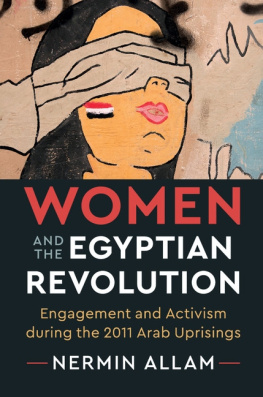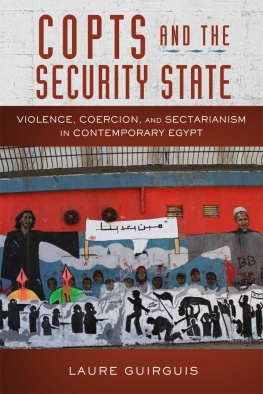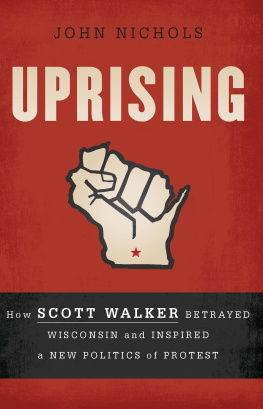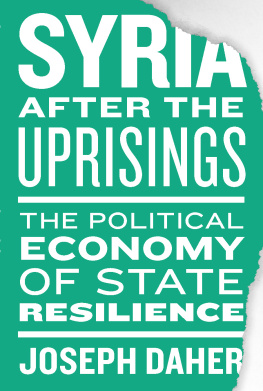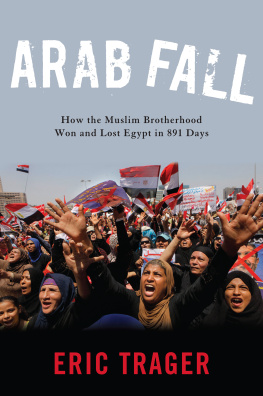Since the fall of the former Egyptian president usn Mubarak, female activists have faced the problem of how to transform the spirit of the uprising into long-lasting reform of the political and social landscape. In Women and the Egyptian Revolution , Nermin Allam tells the story of the 2011 uprising from the perspective of the women who participated, based on extensive interviews with female protestors and activists. The book offers an oral history of womens engagement in this important historical juncture; it situates womens experience within the socioeconomic flows, political trajectories, and historical contours of Egypt. Allam develops a critical vocabulary that captures womens activism and agency by looking both backwards to Egypts gender history and forwards to the outcomes and future possibilities for womens rights. An important contribution to the under-researched topic of womens engagement in political struggles in the Middle East and North Africa, this book will have a wide-ranging impact on its field and beyond.
Nermin Allam is Assistant Professor of Political Science at Rutgers University, New Jersey, and was formerly the Social Sciences and Humanities Research Council of Canada Postdoctoral Fellow at the Department of Politics at Princeton University. She holds a D.Phil. in Comparative Politics and International Relations from the University of Alberta, Canada.
University Printing House, Cambridge CB2 8BS, United Kingdom
One Liberty Plaza, 20th Floor, New York, NY 10006, USA
477 Williamstown Road, Port Melbourne, VIC 3207, Australia
4843/24, 2nd Floor, Ansari Road, Daryaganj, Delhi 110002, India
79 Anson Road, #06-04/06, Singapore 079906
Cambridge University Press is part of the University of Cambridge.
It furthers the Universitys mission by disseminating knowledge in the pursuit of education, learning, and research at the highest international levels of excellence.
www.cambridge.org
Information on this title: www.cambridge.org/9781108434430
DOI: 10.1017/9781108378468
Nermin Allam 2018
This publication is in copyright. Subject to statutory exception and to the provisions of relevant collective licensing agreements, no reproduction of any part may take place without the written permission of Cambridge University Press.
First published 2018
Printed in the United Kingdom by Clays, St Ives plc
A catalogue record for this publication is available from the British Library.
ISBN 978-1-108-42190-4 Hardback
ISBN 978-1-108-43443-0 Paperback
Cambridge University Press has no responsibility for the persistence or accuracy of URLs for external or third-party internet websites referred to in this publication and does not guarantee that any content on such websites is, or will remain, accurate or appropriate.
Mom, you are my rock.
Acknowledgments
These acknowledgments cannot do justice to the deep gratitude I have for my family, mentors, and friends without whom this journey would have been impossible. I thank Dr. Yasmeen Abu-Laban for many years of valuable mentorship, sincere advice, and enlightened conversation. There are simply no words to express my gratitude for her enduring support. She has given me a model to strive for. This book could not have been possible without her.
I am also greatly indebted to Dr. Amaney Jamal, whose expertise and unequivocal support were invaluable to this academic exercise. I am also deeply grateful for my time as a Social Sciences and Humanities Research Council of Canada Postdoctoral Fellow at Princeton University. The fellowship gave me access to a wonderful community of scholars and intellectuals. My thanks go to Dr. Amaney Jamal, Dr. Mark R. Beissinger, and Dr. Nolan McCarty. Elizabeth Nugent, Killian Clarke, Dan Tavana, and Peace Medie are amazing colleagues.
The Department of Political Science at the University of Alberta, my home during postgraduate studies, will always have a special place in my heart. My people there, the faculty, staff, and colleagues, were and continue to be lifelong friends and mentors. Many thanks to Dr. Janine Brodie, Dr. Andy Knight, Dr. Lois Harder, Dr. Judith Garber, Dr. Robert Aitken, Dr. Mojtaba Mahdavi, Dr. Malinda Smith, Dr. Cressida Heyes, Dr. Roger Epp, and Dr. Ian Urquhart. I am beyond grateful to Siavash Saffari for sharing his knowledge and experience, and to Sevan Beukian, Nathan Andrews, Ghada Asaad, Nisha Nath, Mariam Georgis, Hajar Amidian, Nicole Lugosi, and Anya Kuteleva for their precious friendship.
Dr. Bessma Momani offered many thoughtful comments and insightful suggestions and the book has benefited tremendously from her feedback, as it has from the feedback of the two reviewers for Cambridge University Press. Many thanks to Dr. Jacqueline French for her meticulous editing of the text. After numerous reads and several edits, the errors that linger are my own. Thanks are also due to Dr. Lisa Wedeen, Dr. Nathan Brown, Dr. Wendy Pearlman, Dr. Manal Jamal, Dr. Jill Schwedler, and Dr. Marc Lynch, who were generous enough to read sections of this book and related works. I must also thank Dr. Sarah Parkinson who through her lively conversation, sincere advice, and precious friendship continues to inspire me.
I have been fortunate to receive generous financial support from the University of Alberta, Social Sciences and Humanities Research Council of Canada (SSHRC), and the American Political Science Association (APSA) that ensured I was able to fully concentrate on my research. I am also thankful to the International Development Research Council (IDRC) for offering me a Doctoral Research Grant that supported my fieldwork in Egypt.
Thanks to my participants and interviewees for sharing their time and heartfelt stories. They gave life to the theories behind this project. Without their generosity and support, this research would never have come to fruition. Their passion is contagious and the work they are doing has indeed inspired me.
I am also deeply grateful for my time as a Research Fellow at the American University in Cairo (AUC). The vibrant intellectual community at the AUC provided invaluable feedback and insight. I am grateful to Dr. Martina Rieker, Dr. Mona Amer, Dr. Ghada Barsoum, and Dr. Nadine Sika for the enlightened conversations. It has been a privilege knowing my professor, Dr. Bahgat Korany, who has shared his knowledge, wisdom, and experience. I cannot overstate the extent to which he has shaped the ways in which I see the politics of Egypt and how I write about it.
Thanks go to my Aunt Paula and Uncle Ahmed: they were truly my family and kept me motivated through all the ups and downs. Also to my childhood friends, Dina Aboughazala and Mai Abdel Rahman, whose love, support, and understanding when I failed to call, write, or visit have carried me through. Although we span three continents, their support throughout my study and research has been unequivocal.
Laila, my beautiful niece aka Cairo-based daughter has always been on my mind and in my heart, despite the missed birthdays, school concerts, and not always being there for her. Thanks go to my biggest cheer-leader, my sister, Nihal Allam, for telling me I was bright enough to do well on this path and for carrying on doing that until I finally started to believe it. I am grateful to Ahmed, a friend and soulmate, who for the past five years has given me unwavering support and shown a fascinated interest in my research. His humor, support, and encouragement have helped me beyond words.

